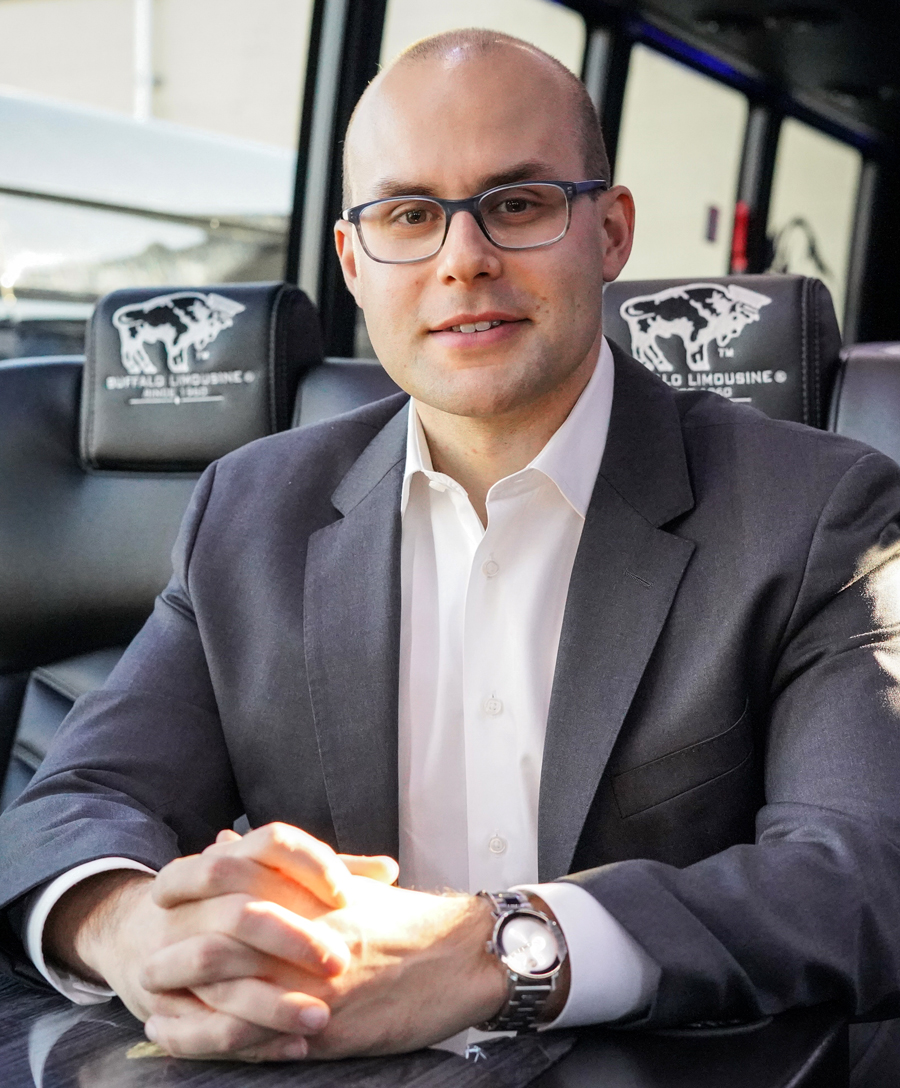- Details
- Category: Industry News
Western New York ground transportation fixture Buffalo Limousine is excited to announce their 60th anniversary of business. Established in 1960 as an offshoot of John and Camille Patti’s funeral service business, the company is recognized as a pioneer in their region, and still adheres to the founders’ credo that “customer service is key.”
 Buffalo Limousine Owners Frank and Carla Boccio
Buffalo Limousine Owners Frank and Carla Boccio
“Customer Service and more customer service was instilled in all of us by my father,” says Carla Boccio, who purchased the family company with her husband Frank in 2000. “We learn something new from our customers every day.”
Today, Buffalo Limousine serves a wide client base, which includes retail, corporate, and VIP/celebrity, as well as exclusive ground transportation contracts with many large companies. And through their extensive affiliate network, the company offers service in 550 cities worldwide.
 Buffalo Limousine General Manager Nick Boccio
Buffalo Limousine General Manager Nick Boccio
Buffalo Limousine’s all-black fleet ranges from sedans and SUVs to executive minibuses and limobuses.
While the company’s milestone seemingly couldn’t come at a worse time for the industry, Boccio remains confident that Buffalo Limousine will weather the storm.
“With age comes wisdom—the adage holds true for companies as well as the people who operate them,” says Boccio.
The company plans to get through the current crisis by maintaining their business philosophies of aiming to be the best and working smarter instead of harder. Boccio feels fortunate that Buffalo Limousine was in a sound position when the COVID crisis hit full force.
A forward-thinking enterprise, the Boccios have always had an eye on future innovations and growth, whether it was adding cellphones to their cars in the ‘70s or being the first in their market with stretch limos in the ‘80s. Today, the company is looking at acquisitions as the next stage of growth. A key component in the company’s future is the family’s third-generation addition: General Manager Nick Boccio came aboard in 2016 and is already a pivotal force to take Buffalo to the next milestone.
“If I've learned anything over the past three years being at Buffalo Limousine it is that customer service remains the foundation of our business being successful,” says Nick. “As far as being the third generation, it makes me happy to know that only a small percentage of family businesses make it that far. Since taking a significant leadership and management role, I would say that ‘working smarter and not harder’ is my goal. I looked at so many minor processes and thought, ‘How in the world have we been doing this for so long?’"
Visit buffalolimousine.com for more information.
[04.20.20]
- Details
- Category: Industry News
As the leader of your business, you’ve probably spent a great deal of time assembling the right people in the right positions. In return, your best team members invest a little bit of themselves in your brand and the success of the company. But, as we inch our way through this pandemic, after weeks of impossibly difficult decisions and shelter-in-place orders, one thing has become clear: the old playbook just became obsolete. CEO no longer stands for Chief Executive Officer; it’s evolving into Chief “Empathy” Officer.
Maurice Brewster, Founder and CEO of Mosaic Global Transportation in California, has been exploring the emotional and spiritual aspect of his leadership after having to furlough more than 100 employees.
 Mosaic Global Transportation Founder and CEO Maurice Brewster
Mosaic Global Transportation Founder and CEO Maurice Brewster
“It’s our job as leaders to take care of and develop the staff—that’s the job,” he says. “Now, it’s just as important to keep spirits high and help them stay engaged. I know our employees feel like they are on an island. I want them to know that I feel their concerns and I’m with them spiritually, emotionally, and in theory.”
After more than 18 years in business, Brewster says he’s learning and adapting his leadership style, driven by five key points to help sustain a team mentality from a distance.
1. Communication – “Because our company leaders and employees are sheltering at home, unemployed and on some sort of unemployment benefits, constant and effective communication is key to keeping them engaged,” he says. “The virtual world offers many different means of communication, which can include phone calls, emails, text messages, instant messaging, and video conferencing. Consistent, prompt, and timely communication will help maintain synergy.”
Bottom line: There’s a reason why so many cite specific government officials as “effective leaders” during this crisis, usually those who convey confidence and consistently provide relevant information. Your employees—furloughed or not—aren’t necessarily expecting you to have all the answers, but they are hoping that you will listen to them, express some optimism, and keep them informed.
2. Trust – “Developing trust from afar is not as easy as walking down the hallway or going out to lunch to chat with employees. Trust is built at the individual level. Remembering the special needs of each person allows them to know we care and are still listening. It will be vitally important to have open and honest dialogue, allowing for lots of feedback. We MUST be willing to make ourselves accessible and available to our employees,” he says.
Bottom line: Meet employees on their level. It requires a bit of effort to contact your team outside of normal channels—usually the company email—but these aren’t normal times. Beyond a weekly email to the team, Brewster has had numerous one-on-one conversations with those who desire it. Many times, the conversations aren’t about the job, but about their family, their anxiety, or their personal situations. Listening builds trust. It also benefits the listener.
3. Clarity – “Our employees must have a clear understanding of what’s going on in our company as often as possible,” he says. For example, Brewster recently addressed a nervous employee who questioned whether it was safe to come to work at all, especially when the governor has implemented a stay-at-home order. Because Mosaic was deemed an essential service thanks to some government contracts, he detailed the new office and vehicle sanitization efforts they are taking (in compliance with the latest safety guidelines available to them) to ensure that those who are working remain as safe as possible, practices that will continue when others return.
Bottom line: When employees have questions, it’s important to be as forthcoming and transparent as possible. If you don’t have the answer, find out and follow up. Don’t make something up.
4. Support – “Our employees need to know that we realize they could feel lonely and like they are on an island during these times. For the most part, they may be fearful of losing their jobs. We need to reach out and ask how they are doing from an emotional point of view. We should share as much as we can and offer support if they need it.”
Bottom line: Employee assistance will likely come in waves, depending upon where your state is with the crisis. After any issues with unemployment, the next wave might be sustaining morale as the shutdown order moves into months. It’s not just their financial health, although important too, but the overall connection they have to your company and their position. It could be walking them through unemployment paperwork, or connecting them with online training courses to help them learn or sharpen skills. Brewster also hosts a weekly “garage” meeting with his senior managers—safely distanced from each other, of course—to make sure that they are sharing and addressing the needs of their employees down the line.
5. Authenticity – “This is about us being real and living in the moment with conviction and confidence. We need to let our employees know, that we will get through this together, while staying true to ourselves. As authentic leaders, we need to put our employees at ease during these tumultuous times,” he says.
Bottom line: “We’re all in this together” can sometimes ring hollow unless there is real action behind the words. Brewster takes his role as cheerleader seriously, although he’s found that he employees have inspired him as much, whether it’s volunteering their time or stepping up to help their friends, co-workers, or neighbors. People first, economics second.
More than ever, your team needs a new kind of leadership. If your goal is to return to business when the world starts moving again, what you do between now and then will determine who comes along for the ride again. Your usual role of big picture prognostication and conveying confidence to clients is still essential, but ensuring the mental hygiene of your team has become critical. Don’t miss your opportunity to be the leader your company needs.
[04.20.20]
- Details
- Category: Industry News
BY BILL FAETH
There will be life and business after coronavirus.

The questions on everyone’s mind are how fast business will come back and when we’ll be “normal." I am an optimist, so I believe we will see the ground transportation industry moving again starting in June with leisure travel (I am writing this in mid-April), followed by business travelers in July. It will be a slow return until the public has confidence.
The truth is, it’s anyone’s guess. Sure, we all have opinions, but Mother Nature is in control right now.
 Limo University Founder Bill Faeth
Limo University Founder Bill Faeth
As we all wait it out, there are things you can be doing now to increase your preparedness and increase the odds of your business coming back faster. It is critical to use this time to sustain and even strengthen your relationships with your clients by engaging your existing base. When we as a nation start moving, we are going to where we are comfortable—our trusted partners.
1. Call your clients. Now is the time to reach out to your clients and have a conversation with them. In no way should you be selling to them, but you should be checking in on them, asking how they are doing, inquiring if you can help them in any way, and letting them know you are still open and operating as an essential service with updated sanitization and safety protocols in place.
Start by calling the clients with whom you have the strongest relationship, then move on to your most valuable clients. Schedule time on your calendar to make these calls each day (at the same time), so it becomes a part of your daily routine.
2. Write emails. Most companies I have worked with over the years don’t prioritize email marketing to their clients and prospects because “they don’t have time.” Well, now is the time to start writing emails that you can use when your business starts to roll again. You should begin by understanding that the content within your emails should be uniquely targeted to the different types of clients you have (I call them Buyer Personas). There’s no one-size-fits-all email here.
Identify your Top 3 Buyer Personas and write three emails to each of them, personalize them, and make sure your content benefits them and not you. This segmentation is vital because not all content will apply to all targets.
3. Update your website/social media. This is a BIG one as your website most likely doesn’t contain content regarding your new protocols for combating the spread of COVID-19 (protecting both your clients and chauffeurs). Now is the time to define (update) your SOPs for disinfecting your vehicles and sanitizing them after each trip, as well as the procedures you are taking to keep your staff safe. Post on the homepage of your website along with additional protocols such as contactless service, luggage handling policies, greeting policies, etc., and then link to a dedicated page on your website that has images to accompany these steps. Pro Tip: Include this information in the emails you start writing to your clients and your social media posts across all channels.
4. Prepare. Execute. Before you start on these projects, take some time to plan out your strategy by documenting goals, objectives, and timelines. Then start preparing by gathering the needed assets and resources you will need. But, before you do, be sure you schedule your “execution time” on your calendar, so it becomes a priority. Now you’re ready to execute. This part is simple if you have made it a priority and have the focus to complete each task before you move onto the next. Don’t move onto the next until the previous task is completed. It will be a recipe for failure as the uncompleted tasks pile on top of each other. One at a time!
Be among the few who is well prepared with a plan of attack. You should be thinking about this like you are starting your business from scratch again as you rekindle relationships, while targeting new verticals and prospects when you begin to grow again. It’s not going to be easy, but the ones who prepare and work the plan now will have an advantage when the world slowly opens again for business.
Bill Faeth is the founder of Limo University. He can be reached at bill@limogrowth.com.
[04.20.20]

